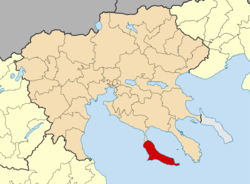Pallene (Chalcidice)
|
Kassandra Κασσάνδρα |
|
|---|---|

Kassandra municipality
|
|
| Coordinates: 40°03′N 23°25′E / 40.050°N 23.417°ECoordinates: 40°03′N 23°25′E / 40.050°N 23.417°E | |
| Country | Greece |
| Administrative region | Central Macedonia |
| Regional unit | Chalkidiki |
| Area | |
| • Municipality | 334.3 km2 (129.1 sq mi) |
| • Municipal unit | 206.1 km2 (79.6 sq mi) |
| Population (2011) | |
| • Municipality | 16,672 |
| • Municipality density | 50/km2 (130/sq mi) |
| • Municipal unit | 10,760 |
| • Municipal unit density | 52/km2 (140/sq mi) |
| Time zone | EET (UTC+2) |
| • Summer (DST) | EEST (UTC+3) |
| Postal code | 631 00 |
| Area code(s) | 23710 |
| Vehicle registration | ΧΚ |
Kassandra (Κασσάνδρα) or Kassandra Peninsula (Χερσόνησος Κασσάνδρας) is a peninsula and a municipality in Chalkidiki, Greece. The seat of the municipality is in Kassandreia.
The municipality Kassandra was formed at the 2011 local government reform by the merger of the following 2 former municipalities, that became municipal units (communities in brackets):
The municipality has an area of 334.280 km2, the municipal unit 206.097 km2.
Pallene (Greek: Παλλήνη) is the ancient name of the westernmost of the three headlands of Chalcidice, which run out into the Aegean Sea. It is said to have anciently borne the name of Phlegra (Φλέγρα) and to have witnessed the conflict between the gods and the earthborn Gigantes. The modern name of the peninsula is Kassandra, which, besides affording excellent winter pasture for cattle and sheep, also produces an abundance of grain of superior quality, as well as wool, honey, and wax, besides raising silkworms. In antiquity, Pallene was the site of numerous towns: Sane, Mende, Scione, Therambos, Aege, Neapolis, Aphytis, which were either wholly or partly colonies from Eretria.
Strabo mentions the following five cities of Pallene in the 1st century BC (Cassandreia, Aphytis, Mende, Scione and Sane).
After the founding of the Roman colony of Cassandreia (43 BC), the entire peninsula of Pallene was included in the colony territory.
In Late Antiquity, the center of the peninsula was the city of Cassandreia, located at the site of ancient Potidaia. A polis and a bishopric, Cassandreia was destroyed by the Huns in 539 or 540 AD. After this, Emperor Justinian I built a wall at the entrance of the peninsula, but it is not until the 10th century that a sizeable settlement—described as a township (polichnion) and later as a fortress (kastron)—re-appears in the peninsula and that the bishopric is mentioned again, as a suffragan of Thessalonica. The area prospered due to its fertility, and both Thessalonians as well as the monks of the growing monastic community at nearby Mount Athos had estates there.
...
Wikipedia


